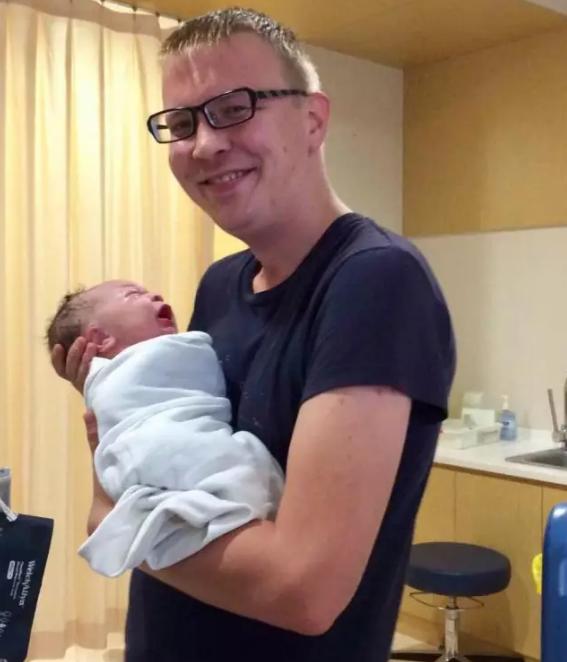當(dāng)前位置: Language Tips> 專欄作家> 老外在中國(guó)
分享到
在我愛人懷孕前,我們就打算進(jìn)行無痛分娩。但就在預(yù)產(chǎn)期前一周,我們才知道甚至沒有無痛分娩這個(gè)選項(xiàng)。

By Erik Nilsson
“Kill me!” my wife shouted.
“殺了我吧!”我的妻子喊道。
She meant it.
她沒有開玩笑。
I could see it in her face.
她的表情告訴我。
She truly wanted to die.
她真的不想活了。
I'd never seen a human suffer so much.
我從未見過一個(gè)人會(huì)遭受如此巨大的痛苦。
Her body hurt more than ever.
她的痛不欲生。
My soul hurt more than ever.
我的心里則倍受煎熬。
Our son was about to enter this world.
我們的兒子就要來到這個(gè)世界上了。
She wanted to exit it.
她卻想著要離開。
Anything to stop the pain. Anything.
她想盡快結(jié)束這種痛苦,無論用何種手段。
My wife had leapt from her bed and was jumping up and down, thrashing her limbs, howling — her face contorted in a way I'd never seen and haven't since.
我的妻子從床上蹦下來,上躥下跳,扭動(dòng)著四肢,瘋狂吼叫,我從未在她臉上見過如此扭曲的表情,以前和以后都沒有過。
And I never want to.
而且,我也不想看到。
The recent news of a woman who committed suicide in Shaanxi province's Yulin when childbirth became unbearable brought us back to that moment.
近期一則關(guān)于陜西榆林孕婦因無法生產(chǎn)忍受痛苦而自殺的新聞將我和妻子又帶回了當(dāng)初她分娩的時(shí)刻。
It literally hit home.
這一新聞切中時(shí)弊。
The 26-year-old had originally insisted on a natural birth but began to beg for a C-section when the torment of labor became insufferable.
26歲的孕婦原本堅(jiān)持順產(chǎn),但由于無法忍受生產(chǎn)過程的痛苦折磨,因而開始請(qǐng)求剖腹產(chǎn)。

There are questions about responsibility. The woman's family and the hospital offer differing accounts as to who refused her request for the procedure.
孕婦自殺究竟是誰的責(zé)任存在質(zhì)疑。女方家屬和醫(yī)院對(duì)誰拒絕了孕婦的請(qǐng)求各執(zhí)一詞。
(Media reports aren't clear as to whether local or spinal anesthesia was an option — and if not, why not.)
(媒體沒有明確報(bào)道醫(yī)院是否提供了局部麻醉了,如果沒有,那么為什么呢?)
But the point is that pain-free childbirth is indeed rare in the country.
但關(guān)鍵是,無痛分娩在中國(guó)確實(shí)尚未成熟。
It accounts for 5 percent of births nationwide and about 30 percent in Beijing.
無痛分娩在中國(guó)所占比率為5%,在北京比率為30%。
The figure is 85 percent in the United States.
而這一數(shù)據(jù)在美國(guó)為85%。
Guangzhou Women and Children's Medical Center's anesthesia department director, Song Xingrong, tells China Daily four out of five women who come to the hospital are unaware of it.
廣州市婦幼保健所麻醉科主任宋興榮在接受《中國(guó)日?qǐng)?bào)》采訪時(shí)指出,有80%的孕婦來到醫(yī)院時(shí)根本對(duì)無痛分娩沒有概念。
We learned it often isn't even an option — about a week before Sagan's due date.
大約在薩根的預(yù)產(chǎn)期前一周,我們才知道甚至無法選擇無痛分娩。
The love of my life and I stood outside a public hospital, holding each other and sobbing.
我和我的愛人在一家公立醫(yī)院門口,相擁哭泣。
We'd previously arranged for our son to be born at the same private hospital as our daughter. There are various reasons we'd elected public hospitals.
起初,我們打算在此前女兒出生的那家私立醫(yī)院生下我們的兒子,但后來因?yàn)楦鞣N原因我們選擇了一家公立醫(yī)院。
One is they informed us there probably wouldn't be an anesthesiologist available.
原因之一是,我們被告知可能會(huì)沒有麻醉師進(jìn)行麻醉。
We knew how excruciating birth could be, having already brought our first child into the world.|
我們知道分娩是多么痛苦,因?yàn)槲覀円呀?jīng)有一個(gè)孩子了。
The epidural was planned before the pregnancy.
在我愛人懷孕前,我們就打算進(jìn)行硬膜外麻醉。
But the private hospital dropped us about two weeks before the birth, citing an unrelated health condition my wife has that would in no way affect pain-free childbirth.
但在預(yù)產(chǎn)期前兩周,那家私立醫(yī)院以我妻子的健康狀況為由將我們打發(fā)了。這個(gè)不相干的理由對(duì)進(jìn)行無痛分娩毫無影響。
We couldn't hop on a plane to elsewhere by then.
那時(shí),我們根本不可能跳上飛機(jī),飛到別的地方。
So, public hospitals seemed our only choice.
所以,公立醫(yī)院成為我們唯一的選擇。
We were devastated. Horrified. Desperate.
之后,恐懼和絕望就縈繞在我和妻子周圍。
Some people can endure giving birth without an epidural.
有些人可以忍受沒有硬膜外麻醉的分娩。
My wife knew the stakes.
但我妻子知道那樣做的危險(xiǎn)。
Fortunately, we found another private hospital that accepted us, last minute. It was expensive. And worth every penny.
幸運(yùn)的是,我們?cè)谧詈笠豢陶业搅硪患以敢饨邮瘴覀兊乃搅⑨t(yī)院。雖然價(jià)錢昂貴,但十分值得。
We cried again. This time, again, for joy.
我們哭了,這一次是喜悅的眼淚。
About a week later, we were sobbing once more.
一周后,我們又一次哭了。
This time, because of my wife's labor pains.
這次,是因?yàn)槲移拮拥耐纯唷?/p>
At one point, my wife screamed, “If I had a gun ...”
只聽我的妻子叫喊道,“如果給我把槍……”
She meant it.
她是認(rèn)真的。
I could see it in her face.
我可以從她的表情判斷出來。
Fortunately, the anesthesiologist arrived. Quickly.
幸運(yùn)的是,麻醉師很快趕來了。
My wife was able to bear childbirth.
我的妻子得以順利生產(chǎn)。
Sagan was born in Beijing on Aug 16, 2015.
薩根于2015年8月16日出生在北京。

We cried a final time. A final time, for joy.
那是我們最后一次流淚,感動(dòng)的眼淚。
英文來源:“CHINA DAILY”微信公眾號(hào)
翻譯:司斌(中國(guó)日?qǐng)?bào)網(wǎng)iNews譯者)
編審:丹妮 董靜
音頻編輯:焦?jié)?/p>
更多內(nèi)容請(qǐng)關(guān)注“CHINA DAILY”微信公眾號(hào):
Broadcaster

Erik Nilsson is an American journalist who has worked in China for over 10 years. His work has won various honors, including the Chinese Government Friendship Award - the highest honor the country bestows on foreigners. He has traveled to every provincial-level jurisdiction except Chongqing and Guangdong, covering such stories as the Wenchuan and Yushu earthquakes, nomadic communities’ development and civil society.
上一篇 : 老外在中國(guó):格斗孤兒,警察能做的不只是執(zhí)法
下一篇 :
分享到
關(guān)注和訂閱

關(guān)于我們 | 聯(lián)系方式 | 招聘信息
電話:8610-84883645
傳真:8610-84883500
Email: languagetips@chinadaily.com.cn